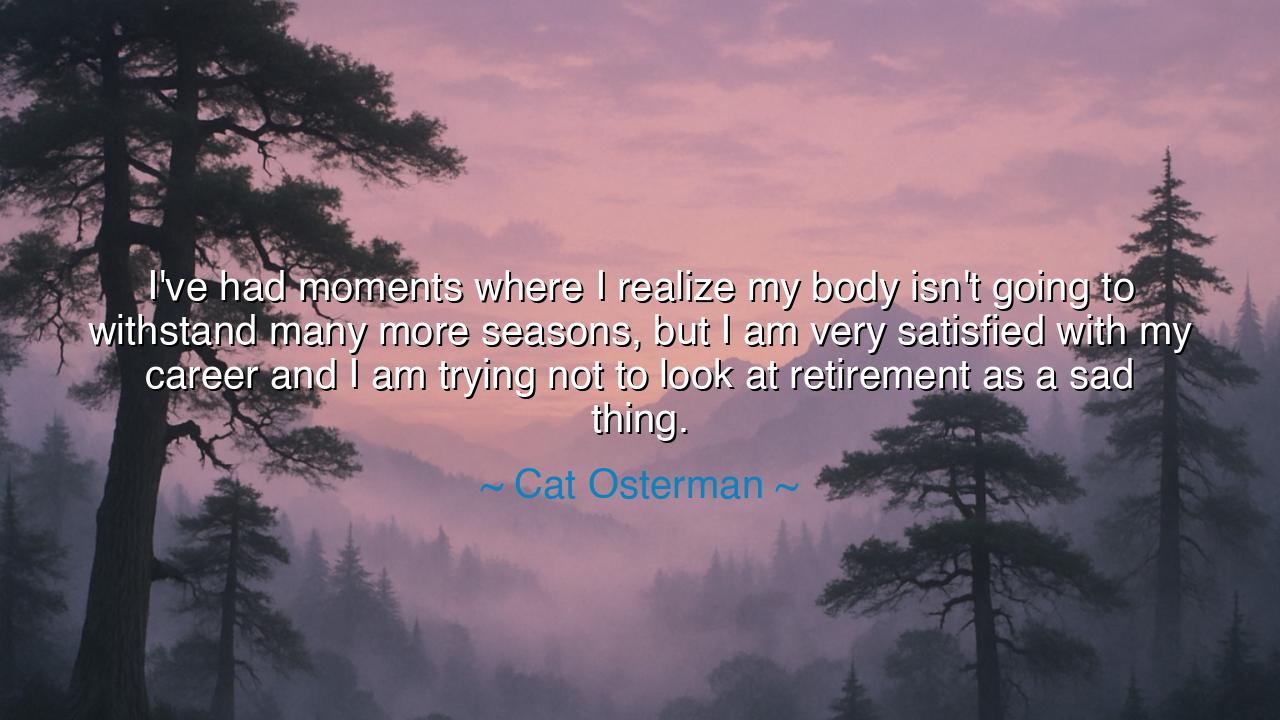
I've had moments where I realize my body isn't going to withstand
I've had moments where I realize my body isn't going to withstand many more seasons, but I am very satisfied with my career and I am trying not to look at retirement as a sad thing.






The words of Cat Osterman carry both weight and grace: “I’ve had moments where I realize my body isn’t going to withstand many more seasons, but I am very satisfied with my career and I am trying not to look at retirement as a sad thing.” In this reflection, the great pitcher of American softball voices a universal truth—the mortal body has limits, but the spirit can still rejoice in fulfillment. What once seemed endless, the years of play and triumph, must one day come to a close. Yet within that ending lies not despair, but gratitude and peace.
The origin of these words rests in Osterman’s own journey through the pinnacle of sport. From a young age she devoted herself to the diamond, her left arm becoming a weapon feared by opponents. She carried her teams to victories, earned medals for her country, and inspired generations of players. Yet time, relentless as ever, whispered that no career in sport lasts forever. Her recognition of her body’s limits did not diminish her glory—it deepened it, for she could see her career whole, a completed work of art, rather than mourning what was lost.
The ancients knew this wisdom well. The Olympic athletes of Greece trained their bodies to near-perfection, yet even they retired young, their strength fleeting as the seasons. Pindar, the poet of victory, sang not only of triumph but of the brevity of athletic fame. He reminded champions that the garland of victory withers quickly, but the honor of their deeds endures. Osterman’s words echo this same song: though her body can no longer endure “many more seasons,” her legacy stands firm, untouched by time.
History also recalls the example of Jackie Robinson. Though he broke baseball’s color barrier and reshaped the sport forever, his playing career was short, ended by the toll of strain and disease. Yet his impact was not diminished by retirement; it was magnified. His years of play were not the measure of his greatness—his courage and achievement were. So too with Osterman: her career was not only about innings and strikeouts, but about the inspiration she gave to others, and the doors she opened for women in sport.
Her words also carry a profound lesson about endings. Many view retirement as sadness, a time of decline, the fading of purpose. But Osterman teaches us that an ending need not be sorrowful if it is embraced with satisfaction. To see one’s life as a tapestry, woven thread by thread, and to recognize its beauty, is to make peace with the close of any chapter. For the body may grow weary, but the spirit can rest proud, knowing it gave all it had to give.
The lesson for us is clear: do not fear endings, but prepare for them with dignity. Whatever field you labor in—whether in sport, art, or work—there will come a time when your body, your strength, or your circumstances no longer permit you to continue as before. Do not greet that time with bitterness. Instead, look back with gratitude on the path you have walked, and forward with courage to the new ways you may serve, teach, or inspire.
Practical action lies within reach: while you are in your season, give your all, so that when the season ends, you may rest without regret. Celebrate your accomplishments not in comparison to others, but in the fullness of what you have poured into them. And when change comes, carry your wisdom into new forms—mentorship, storytelling, the nurturing of those who follow your path. In this way, retirement is not an end but a transformation.
So let us hold Cat Osterman’s wisdom close: retirement need not be sad if life has been lived with fullness and dedication. The seasons pass, the body tires, but the legacy remains, eternal in the lives touched and the example given. In this truth lies not sorrow, but a quiet, enduring triumph.






AAdministratorAdministrator
Welcome, honored guests. Please leave a comment, we will respond soon